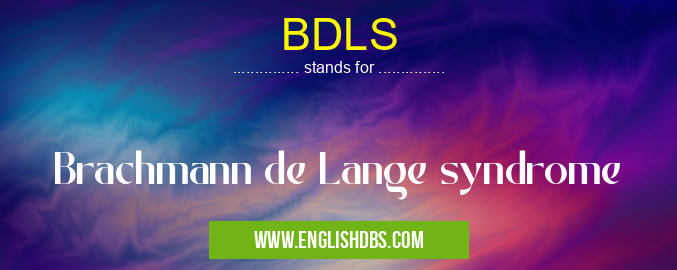What does BDLS mean in SYNDROMES
Brachmann de Lange syndrome, otherwise known as BDLS, is a rare genetic disorder associated with severe cognitive impairments and physical deformities. It is estimated that one in 30,000 to 50,000 people are affected by this condition. Those with BDLS experience a range of symptoms affecting multiple systems of the body including the cardiovascular system, skeletal system, and the central nervous system. Despite its low prevalence rate, BDLS can have significant impacts on individuals and those around them.

BDLS meaning in Syndromes in Medical
BDLS mostly used in an acronym Syndromes in Category Medical that means Brachmann de Lange syndrome
Shorthand: BDLS,
Full Form: Brachmann de Lange syndrome
For more information of "Brachmann de Lange syndrome", see the section below.
Symptoms
The first signs of Brachmann de Lange Syndrome begin to manifest shortly after birth often through visible physical characteristics such as thin or sparse hair, wide set eyes and a thin upper lip. As the individual grows up they may also suffer from poor muscle tone which leads to difficulties when it comes to sitting upright or running and walking normally. Cognitively those affected by BDLS may also have learning difficulties such as impaired language skills as well as delayed intellectual development. There can also be other associated issues impacting social interaction such as autism spectrum disorders.
Treatment
Currently there is no cure for BDLS however there are treatments available which can help improve symptoms and quality of life for those living with it. Speech therapies specifically designed for those suffering from developmental delays associated with Brachmann de Lange Syndrome can be beneficial in helping an individual learn how to talk better or understand language more easily. Physical therapy can help strengthen muscles while medications such as anticonvulsants may be used to control seizures in cases where epilepsy is present alongside this genetic disorder. Proper medical supervision should be provided at all times to ensure that any changes in symptoms are monitored and managed appropriately.
Essential Questions and Answers on Brachmann de Lange syndrome in "MEDICAL»SYNDROMES"
What is Brachmann de Lange Syndrome?
Brachmann de Lange syndrome is a rare genetic disorder that affects multiple parts of the body. People with this condition have distinctive facial features such as high forehead, widely spaced eyes, and small mouth; along with other physical problems such as poor muscle tone, feeding difficulties, short stature, intellectual disability, and heart defects.
What causes Brachmann de Lange Syndrome?
Brachmann de Lange Syndrome is caused by the mutation of certain genes in the NIPBL gene or SMC1A gene. In some cases, it can be inherited from one or both parents who carry the genetic mutation.
What are the symptoms of Brachmann de Lange Syndrome?
Common symptoms include growth delays, distinct facial features such as wide-set eyes or large ears, low muscle tone (hypotonia), small head size (microcephaly), developmental delays in speech and motor milestones such as sitting up or walking, intellectual disability, seizures and various physical malformations.
Is there a cure for Brachmann de Lange Syndrome?
Currently there is no cure for Brachman de Lange Syndrome, but treatment focuses on managing each individual symptom to ensure quality of life for those affected by this condition. This includes physical and occupational therapy to help improve movement and strength; speech language therapy to help support communication; medications to help manage seizures if present; medical therapies for heart problems if present; nutritional support for growth problems if needed; assistance with activities of daily living; and overall supportive family care.
Who is at risk of developing Brachmann de Lange Syndrome?
The chance of having a child with BDL depends on whether either parent carries the mutated gene responsible for this syndrome. A person diagnosed with BDL has a 50% chance of passing on their mutated gene in each pregnancy.
How is Brachmann de Lange Syndrome diagnosed?
Diagnosis may include chromosomal testing (karyotyping) which helps reveal genetic disorders including BDL; a series of physical examinations that can assess facial features characteristic to BDL & other physical malformations associated with this condition; biochemical genetic analysis including DNA sequencing which helps detect mutations in certain genes associated with BDL & further confirm diagnosis through advanced techniques like next-generation sequencing (NGS). Additional specialized tests may also be recommended depending upon individual's presentation & ongoing clinical management needs.
Are there any complications associated with Brachman de Lange Syndrome?
Complications associated with BDL can include intellectual disability that affects school performance, behavioral issues requiring psychotherapeutic intervention & regular monitoring from mental health specialists; respiratory problems due to laryngeal webbing or vocal cord palsy requiring close medical supervision & possible surgical interventions like tracheostomy when necessary; joints contractures causing limited mobility with chronic pain that may need joint aspiration/injection treatments for improvement; among many other potential malformations or medical conditions associated chronic management needs.
How can I best support my loved one who has been diagnosed with Brachman De Lange Syndrome?
Being supportive & utilizing available resources is essential when caring for someone who has received an abnormal diagnosis such as BDL syndrome. Educating yourself about both typical & atypical development along with elements concerning Brachtman-DeLange syndrome will lead to a better understanding concerning individual's overall presentation as well as allow you to navigate related resources more efficiently when needed. Additionally exploring social interaction opportunities like day camps geared towards children living medical disabilities will foster quality self esteem throughout different stages personal development.
Final Words:
Brachmann de Lange Syndrome (BDLS) is a rare genetic condition that affects individuals both physically and mentally with varying degrees of severity depending on each case presented. However, despite its rarity many treatments exist which aim to ease symptoms and improve quality of life for those who suffer from this disability - ranging from speech therapies to medications used to control seizures depending on each specific situation presented by an individual patient.
